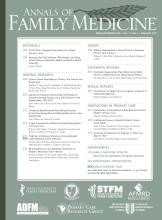Abstract
PURPOSE Efforts to better understand the impact of clinic member relationships on care quality in primary care clinics have been limited by the absence of a validated instrument to assess these relationships. The purpose of this study was to develop and validate a scale assessing relationships within primary care clinics.
METHODS The Work Relationships Scale (WRS) was developed and administered as part of a survey of learning and relationships among 17 Department of Veterans Affairs (VA) primary care clinics. A Rasch partial-credit model and principal components analysis were used to evaluate item performance, select the final items for inclusion, and establish unidimensionality for the WRS. The WRS was then validated against semistructured clinic member interviews and VA Survey of Healthcare Experiences of Patients (SHEP) data.
RESULTS Four hundred fifty-seven clinicians and staff completed the clinic survey, and 247 participated in semistructured interviews. WRS scores were significantly associated with clinic-level reporting for 2 SHEP variables: overall rating of personal doctor/nurse (r2 =0.43, P <.01) and overall rating of health care (r2= 0.25, P <.05). Interview data describing relationship characteristics were consistent with variability in WRS scores across low-scoring and high-scoring clinics.
CONCLUSIONS The WRS shows promising validity as a measure assessing the quality of relationships in primary care settings; moreover, primary care clinics with lower WRS scores received poorer patient quality ratings for both individual clinicians and overall health care. Relationships play an important role in shaping care delivery and should be assessed as part of efforts to improve patient care within primary care settings.
- Received for publication April 2, 2012.
- Revision received January 30, 2013.
- Accepted for publication February 18, 2013.
- © 2013 Annals of Family Medicine, Inc.







